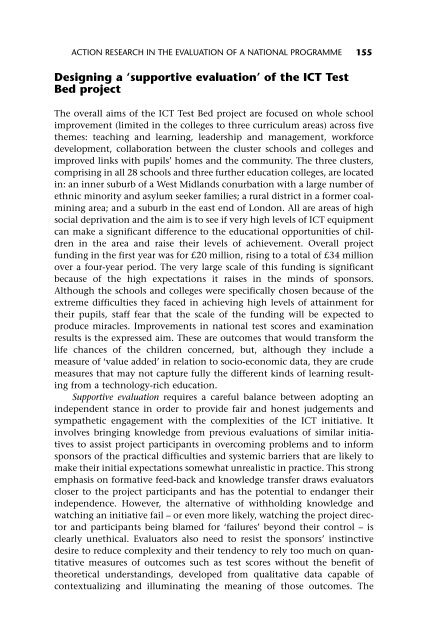Action Research A Methodology for Change and Development
Action Research A Methodology for Change and Development
Action Research A Methodology for Change and Development
You also want an ePaper? Increase the reach of your titles
YUMPU automatically turns print PDFs into web optimized ePapers that Google loves.
ACTION RESEARCH IN THE EVALUATION OF A NATIONAL PROGRAMME 155<br />
Designing a ‘supportive evaluation’ of the ICT Test<br />
Bed project<br />
The overall aims of the ICT Test Bed project are focused on whole school<br />
improvement (limited in the colleges to three curriculum areas) across five<br />
themes: teaching <strong>and</strong> learning, leadership <strong>and</strong> management, work<strong>for</strong>ce<br />
development, collaboration between the cluster schools <strong>and</strong> colleges <strong>and</strong><br />
improved links with pupils’ homes <strong>and</strong> the community. The three clusters,<br />
comprising in all 28 schools <strong>and</strong> three further education colleges, are located<br />
in: an inner suburb of a West Midl<strong>and</strong>s conurbation with a large number of<br />
ethnic minority <strong>and</strong> asylum seeker families; a rural district in a <strong>for</strong>mer coalmining<br />
area; <strong>and</strong> a suburb in the east end of London. All are areas of high<br />
social deprivation <strong>and</strong> the aim is to see if very high levels of ICT equipment<br />
can make a significant difference to the educational opportunities of children<br />
in the area <strong>and</strong> raise their levels of achievement. Overall project<br />
funding in the first year was <strong>for</strong> £20 million, rising to a total of £34 million<br />
over a four-year period. The very large scale of this funding is significant<br />
because of the high expectations it raises in the minds of sponsors.<br />
Although the schools <strong>and</strong> colleges were specifically chosen because of the<br />
extreme difficulties they faced in achieving high levels of attainment <strong>for</strong><br />
their pupils, staff fear that the scale of the funding will be expected to<br />
produce miracles. Improvements in national test scores <strong>and</strong> examination<br />
results is the expressed aim. These are outcomes that would trans<strong>for</strong>m the<br />
life chances of the children concerned, but, although they include a<br />
measure of ‘value added’ in relation to socio-economic data, they are crude<br />
measures that may not capture fully the different kinds of learning resulting<br />
from a technology-rich education.<br />
Supportive evaluation requires a careful balance between adopting an<br />
independent stance in order to provide fair <strong>and</strong> honest judgements <strong>and</strong><br />
sympathetic engagement with the complexities of the ICT initiative. It<br />
involves bringing knowledge from previous evaluations of similar initiatives<br />
to assist project participants in overcoming problems <strong>and</strong> to in<strong>for</strong>m<br />
sponsors of the practical difficulties <strong>and</strong> systemic barriers that are likely to<br />
make their initial expectations somewhat unrealistic in practice. This strong<br />
emphasis on <strong>for</strong>mative feed-back <strong>and</strong> knowledge transfer draws evaluators<br />
closer to the project participants <strong>and</strong> has the potential to endanger their<br />
independence. However, the alternative of withholding knowledge <strong>and</strong><br />
watching an initiative fail – or even more likely, watching the project director<br />
<strong>and</strong> participants being blamed <strong>for</strong> ‘failures’ beyond their control – is<br />
clearly unethical. Evaluators also need to resist the sponsors’ instinctive<br />
desire to reduce complexity <strong>and</strong> their tendency to rely too much on quantitative<br />
measures of outcomes such as test scores without the benefit of<br />
theoretical underst<strong>and</strong>ings, developed from qualitative data capable of<br />
contextualizing <strong>and</strong> illuminating the meaning of those outcomes. The

















